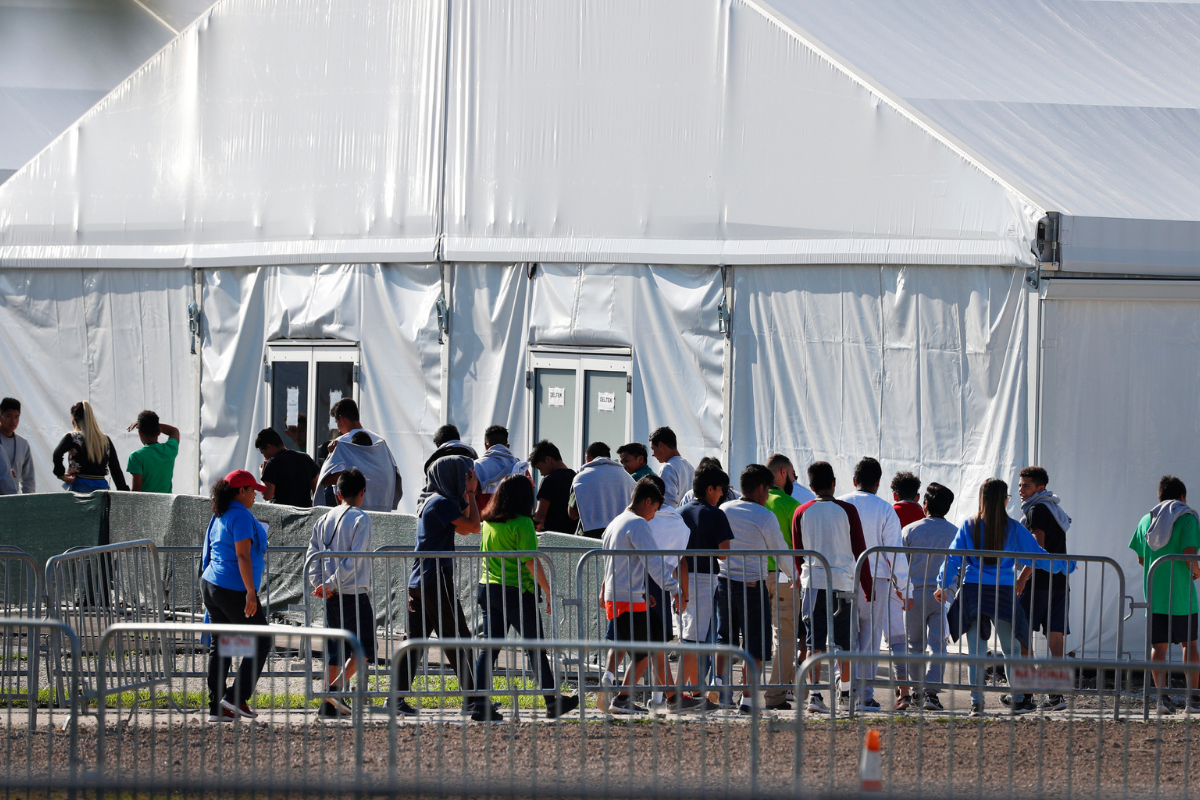

In this February 19, 2019, file photo, children line up to enter a tent at the Homestead Temporary Shelter for Unaccompanied Children in Homestead, Fla. (AP Photo/Wilfredo Lee, File)
United States families are preparing for Thanksgiving and other winter holidays by finding the safest way to celebrate without transmitting COVID-19 to each other.
While the decisions are difficult as each family weighs its own risks, these are the necessary steps to protect loved ones until it will be safer to gather all in-person again. The way Americans celebrate will look different, but thanks to technology, remaining connected is possible.
But the security and gratitude of being together as a family will not occur for 545 children alone and traumatized in this country. American Civil Liberties Union lawyers recently filed with the U.S. Justice Department that 545 detained migrant children have not yet been reunited with their parents.
At the recent presidential debate, when asked about the children separated from their families, President Donald Trump responded dismissively that they have been “so well taken care of.”
This follows the Trump administration’s implementation of the “zero tolerance” policy of government-sanctioned separation of children from parents in July 2017 until June 2018. It is estimated that approximately 5,500 migrant children were separated from their parents; 40% were younger than 10 years old.
The nation’s policy was not only in violation of human rights but also was harmful to children’s health.
It has been two years since the policy ended. The lawyers, who had been assigned with reuniting children with parents, have been unable to locate or reach parents of these 545 children.
While parent-child separation is a tragedy experienced around the globe from war, natural disasters, collapsed governments, and trafficking, mandated parent-child separation was an appallingly designed immigration policy.
As a medical asylee evaluator and pediatrician, I have documented the stories of these children’s escapes from gang-led targeted violence, extortion, and the murders of relatives killed in their home countries.
From my field of child health research, I know that children with increasing number of traumatic experiences, sometimes known as adverse childhood experiences (ACEs), are at higher risk for devastating, long-term health consequences, including heart disease and stroke, depression, and suicide.
In our previous study of children with ACEs in the U.S., family factors that promote positive parent-child interaction were significant for childhood resilience, or the general capacity for children to recover from substantial challenges.
The U.S.’ unpopular policy compounded the damages these children had already faced in dreadful ways. The U.S. must remedy the harm caused to these children and their families. Reunification of the remaining children with their families must remain a priority in order to progress toward repairing the damage.
The U.S. government also needs to provide appropriate rehabilitative mental and medical services to the traumatized children and parents. Guaranteed access to trauma-informed care is necessary so that children can receive services in an environment for recovery instead of re-traumatization.
While the U.S. continues to wrestle with consensus on immigration policy, the rights of children and families in policies and practices need protection, along with the guarantee against repeating this egregious policy ever again.
As the holidays approach, the importance of family safety and health is a key concern. But the policies that represent our country must protect all children and families, including non-citizens, who are guaranteed rights by the U.S. Constitution and international law.
In 1995 at the launch of the Children’ Fund, Nelson Mandela stated, “There can be no keener revelation of a society’s soul than the way in which it treats its children.” Recognizing that to build a future generation, the reversal of the “wrong done to our youth” must be a national priority.
In U.S. history, family separation, unfortunately, is not a new federal strategy, but it cannot be the norm.
***
Kristin Kan, MD MPH MSc is a pediatrician, researcher, and Assistant Professor of Pediatrics at Ann and Robert H. Lurie Children’s Hospital of Chicago and Northwestern University, and a Public Voices Fellow with The OpEd Project.


